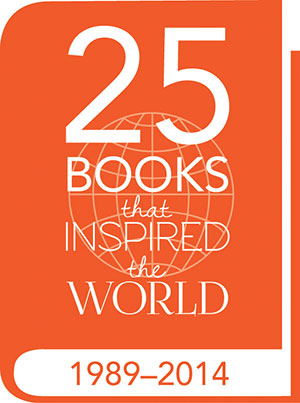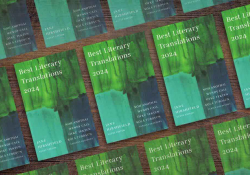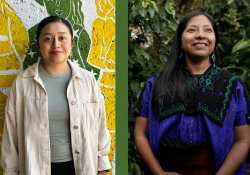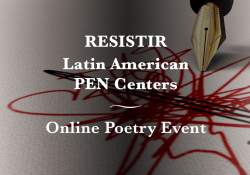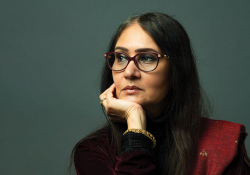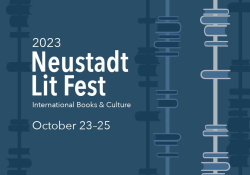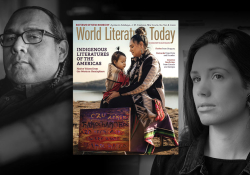Cast Your Vote! 25 Books That Inspired the World (1989–2014)
In conjunction with our November 2014 cover feature—which will focus on central European literature since the fall of the Berlin Wall—the editors of WLT invited 25 writers to nominate one book that most influenced their own writing or ways of seeing the world—from anywhere in the world—and to add a brief statement explaining their choice. Now, it’s your turn to help us choose the best of the best. Read through the longlist below, then vote for your three favorites during our readers’ poll (September 1–21). The results will then be published in the November issue.
The Longlist
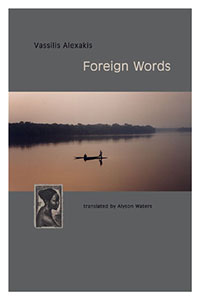 Vassilis Alexakis
Vassilis Alexakis
Les mots étrangers (2002; Eng. Foreign Words, tr. Alyson Waters, 2006)
Nominated by Gianni Skaragas: “I had just become one of those sons who give up everything to care for sick fathers and fell into this novel of introspection. Language is the main character of a story about the silence between words and the distances we travel to regain the ability to describe life—until the world is filled with living speech again. A moving exploration of loss and an intimate affirmation of why we use words to survive.”
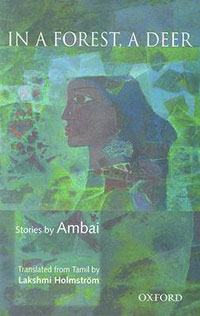 Ambai
Ambai
Kattil oru man (2000; Eng. In a Forest, a Deer, tr. Lakshmi Holmstrom, 2006)
Nominated by Meena Alexander: “I would recommend a collection of short stories by Ambai, which is the nom de plume of the Tamil writer C. S. Lakshmi. In her spare language, which could as well be the diction of poetry, Ambai enters into the often-hallucinatory nature of the everyday in which the contemporary urban Indian woman finds herself. This work delves into both history and our strange amnesiac lives with elegance and wit.”
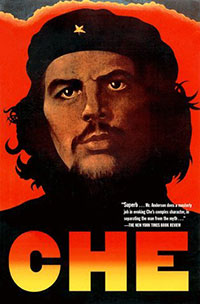 Jon Lee Anderson
Jon Lee Anderson
Che Guevara: A Revolutionary Life (1997)
Nominated by Maaza Mengiste: “Anderson’s carefully researched and superbly written biography of the revolutionary hero complicates the brand name that Che has become. In this book, we meet a man both flawed and dogmatic, with such focused and unbending ideals that they lead him to down paths that many of us will find problematic. What does it mean to truly believe in revolutionary ideals? What does it mean to live them? Everything about this book—its writing, its precision and passion, its unflinching gaze on the real costs of a revolution—changed the way I think about the world and my writing in it.”
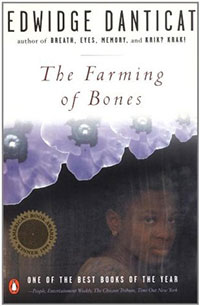 Edwidge Danticat
Edwidge Danticat
The Farming of Bones (1998)
Nominated by Adnan Mahmutović: “Let me suggest The Farming of Bones, by Edwidge Danticat. Similar to my absolute favorite, Toni Morrison, Danticat finds a perfect form for the story she’s telling. It is again the raw energy of it that does not allow for Western ‘perfectionism,’ the messiness and perhaps even some naïveté in precise poetic expression. It is the recognition that myths are a part of our modern histories, or that our modern times are just as mythical as premodern times. It is the way the individual and the intimate are pitted against the grander historical movements that I find inspiring.”
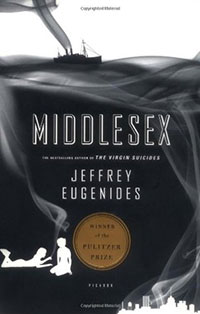 Jeffrey Eugenides
Jeffrey Eugenides
Middlesex (2002)
Nominated by Elif Shafak: “It was so hard to pick just one book, but I’d love to nominate Middlesex, by Jeffrey Eugenides. It left an impact on me, this novel—when I first read it, it was like opening a secret door. The story of a hermaphrodite spoke to me, the epic tale of an individual and the story of a family/culture/society intertwined. It is a narrative that equally embraces sex, gender, culture, and perhaps offers a new form of politics and resistance, all of them close to my heart.”
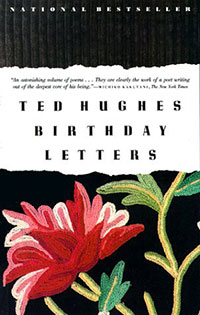 Ted Hughes
Ted Hughes
Birthday Letters (1998)
Nominated by Marina Carr: “I chose Ted Hughes because he is a consummate artist whom I have admired for decades. I chose Birthday Letters because they take my breath away. The calm, collected gaze of them. The light in them. The love. The painful dissection of what has been lost and how. The intense moments of connection and its opposite and throbbing under them all the realization that this script between them was decreed on high and they are merely the actors playing their separate parts. As Hughes says in another poem, “October Salmon”: “All this too is stitched into the torn richness. / The epic poise. / Which holds him so steady in his wounds. / So loyal to his doom. / So patient in the machinery of heaven.”
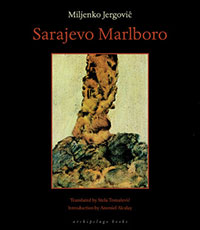 Miljenko Jergović
Miljenko Jergović
Sarajevski Marlboro (1994; Eng. Sarajevo Marlboro, tr. Stela Tomašević, 1997/2004)
Nominated by Aleš Debeljak: “Miljenko Jergović is possibly the leading post-Yugoslav writer. His first collection of short stories attracted affirming attention of local and international readership and won numerous awards, including the Erich Maria Remarque Peace Award, Germany, and the International Award ‘Literature from the Front’ (Italy). Jergović writes in an appealing style that seamlessly weaves an eyewitness account into lyrical observation without neglecting a coherent narrative arch. His fiction is news that stays news.”
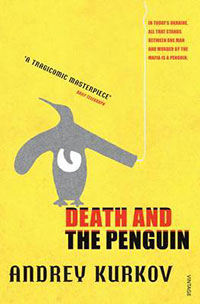 Andrey Kurkov
Andrey Kurkov
Смерτьпосτороннеrо(1996; Eng. Death and the Penguin, tr. George Bird, 2001)
Nominated by Etgar Keret: “The book I chose is Death and the Penguin, by Ukrainian author Andrey Kurkov. I found this incredible blend of humor, sorrow, existential philosophy, and political criticism of his local regime—all in one short novel—very inspiring. Kurkov’s unique tone transcends the many genres the story overlaps and left me not only with a great empathy for human imperfection but also with a great love for penguins.”
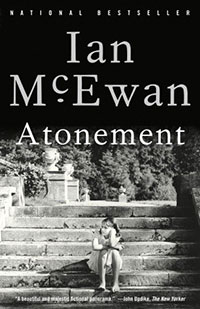 Ian McEwan
Ian McEwan
Atonement (2001)
Nominated by Andrew Lam: “I know it’s quite popular and was made into a movie that was nominated for an Oscar, but for me personally, Atonement demonstrated the power of language, of storytelling, and of imagination on a level I hadn’t thought of before: to atone. To turn guilt and sadness into aesthetic expression. One of the loveliest books I have read in the last decade.”
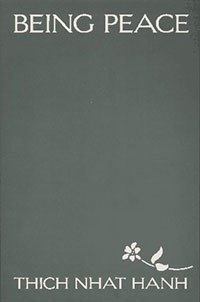 Thích Nhat Hanh
Thích Nhat Hanh
Being Peace (1987)
Nominated by Sandra Cisneros: “Thích Nhat Hanh’s Being Peace has been a life-changing book. It came to me before the Bosnian War and helped me during that difficult time. I lived in Bosnia before the conflict, and the war made me feel especially impotent. Thích Nhat Hanh and his writing helped me to find my voice as a political being and changed me in ways I am still discovering as a writer, and as a daughter, lover, friend. Truthfully, Thích Nhat Hanh’s words have made me a better person. I am deeply grateful to this teacher for showing me the path to peace and transformation.”
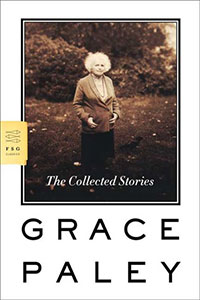 Grace Paley
Grace Paley
Collected Stories (1994)
Nominated by Demetria Martinez: “When I lose direction in my writing and activism, I turn to Grace Paley’s Collected Stories, join her on a New York City stoop, and listen to her tales of neighbors, such as Faith. On a Saturday afternoon at the park, Faith climbs a tree to get a greater perspective on the world, encounters some war protesters, and has a revelation that leads to a new political commitment. Wrapped in wry humor and optimism, Paley’s stories are a revelation.”
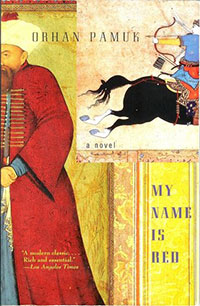 Orhan Pamuk
Orhan Pamuk
Benim adım Kırmızı (1998; Eng. My Name Is Red, tr. Erdağ M. Göknar, 2001)
Nominated by Krys Lee: “Orhan Pamuk is a writer obsessed with time and how culture moves through historical time, and how Turkey negotiates tradition and modernity, a modernity that in many of his novels is betrayed to be a modernity synonymous with the West. The White Castle, an early work of his, makes these themes central to understanding a country that is geographically and culturally at a crossroads of the East and West. This engagement with the crossroads of culture and time is continued in his masterpiece, My Name Is Red. My Name Is Red is both artful, inventive in form, and one of the most artful and intelligent works to examine the struggle of a country and tradition, sometimes rejecting and accepting a Western version of modernity, with dramatic consequences. Through methods of Western realistic painting that clash with a Chinese-influenced abstract tradition of classical truth in sixteenth-century Istanbul, Pamuk examines Turkey’s historical and presently continuing negotiation between two cultures. As a rare, astute examination of the struggle of so many nations today caught between tradition and a modernity dictated by the European and North American cultures, I believe it is one of the most important books written in the past twenty-five years.”
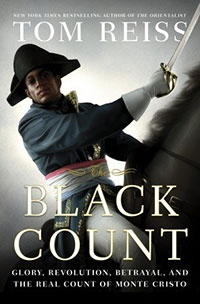 Tom Reiss
Tom Reiss
The Black Count: Glory, Revolution, Betrayal, and the Real Count of Monte Cristo (2012)
Nominated by Mukoma Wa Ngugi: “Alex Dumas, a son of a black slave and white Frenchman, was made a general in the French revolutionary army and married a white Frenchwoman without race being much of a factor. But his son, the novelist Alexandre Dumas, grew up in a virulently racist French society—a change that had everything to do with the slave revolt that became the Haitian revolution. An exciting biography of Dumas, the book also shows how racism, economics, and resistance are related. And why terms like Eurocentric hide bitter internal struggles within the European colonizing societies.”
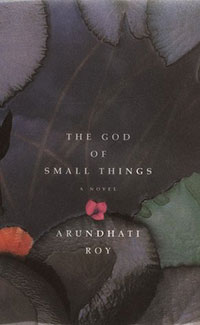 Arundhati Roy
Arundhati Roy
The God of Small Things (1997)
Nominated by Alda Sigmundsdóttir: “It is hard to say exactly what about The God of Small Things mesmerized me the first time I read it. Perhaps the language, which is both original, inventive, and utterly, beautifully true. I was so wide open to it and today sometimes see similar motifs in my own writing, which I believe I absorbed from that book. Also, the deep compassion Roy feels for her characters and the oppressed of her country, coupled with her elegantly expressed fury at the caste system and the hypocrisy of those who propagate it.”
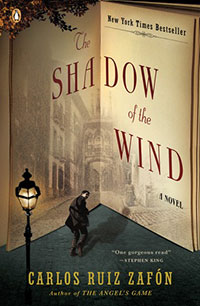 Carlos Ruiz Zafón
Carlos Ruiz Zafón
La Sombra del Viento (2001; Eng. The Shadow of the Wind, tr. Lucia Graves, 2004)
Nominated by Denise Chávez: “I have been deeply impacted by the Spanish writers and what they are doing to create a world of dark magic and redemption from that darkness. The book that has intrigued me deeply is The Shadow of the Wind, by Carlos Ruiz Zafón. It is so inventive and so startling in its concept.”
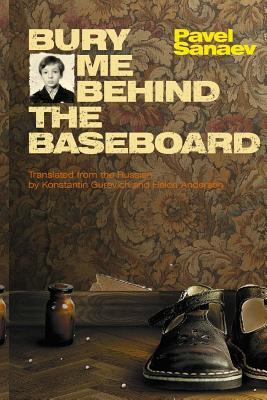 Pavel Sanaev
Pavel Sanaev
Pokhoronite Menia za Plintusom (2003; Eng. Bury Me behind the Baseboard, tr. Konstantin Gurevich & Helen Anderson, 2014)
Nominated by Alina Bronsky: “I am nominating the short novel Bury Me behind the Baseboard, by Pavel Sanaev (originally written in Russian). An autobiographical story about family, love, madness, violence, and trauma—told from the view of an eight-year-old boy—that shook Russia to the core as a surprising portrait of a generation, unveiling the madness of family structures familiar to everybody. Touchingly naïve, tragic, and incredibly funny at the same time.”
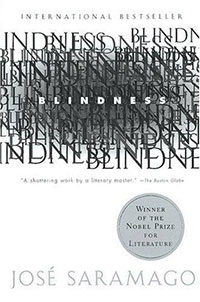 José Saramago
José Saramago
Ensaio sobre a cegueira (1995; Eng. Blindness, tr. Giovanni Pontiero, 1998)
Nominated by Laila Lalami: “In Blindness, the people of an unnamed city lose their sight one after another. As the epidemic spreads, social order breaks down and people commit acts of unspeakable horror as well as occasional acts of kindness. Throughout the novel, Saramago makes readers see that, no matter what society we live in, we remain constrained by our cultural perceptions and prejudices and rarely question the state of the world around us.”
 José Saramago
José Saramago
Ensaio sobre a cegueira (1995; Eng. Blindness, tr. Giovanni Pontiero, 1998)
Nominated by Mahmoud Saeed: “What I love about literature in general and the novel in particular is the degree of human consciousness involved. José Saramago’s novel Blindness talks about humanity’s struggle with savagery, which is a very old struggle. People have passed laws to rein in evil for thousands of years; however, if we find ourselves in a place where there are no laws, we revert to being primitives and beasts. The novel proposes no particular solution but rather leaves us to think about various personal, individual solutions.”
Dieter Schulz
Emerson and Thoreau, or, Steps beyond Ourselves:
Studies in Transcendentalism (2012)
Nominated by Rudolfo Anaya: “This book is the best book I've read on Emerson, and it clarified so much in my own thinking about American culture. This is the book that has been most inspiring to me in recent years.”
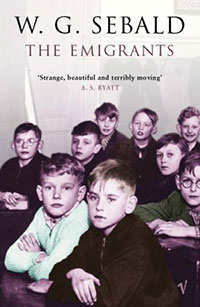 W. G. Sebald
W. G. Sebald
Die Ausgewanderten (1992; Eng. The Emigrants, tr. Michael Hulse, 2002)
Nominated by Rabih Alameddine: “My favorite Sebald—well, for this week at least. Four stories about German emigrants, possibly exiles. Seemingly unconnected at first, they begin to gel into a harrowing look at the effects of the Holocaust, which is hardly, if ever, mentioned. Sebald refuses to soil grief with sentimentalism. The end result is devastating.”
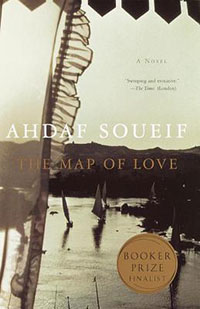 Ahdaf Soueif
Ahdaf Soueif
The Map of Love (1999)
Nominated by Leila Aboulela: “This richly nuanced novel is inspiring for its depiction of East-West, Muslim-Christian, cross-cultural relationships while at the same time upholding a positive, affirmative position. The narrative moves back and forth from modern Cairo to the start of the twentieth century where Lady Anna shocks colonial society by marrying an Egyptian pasha. She moves into his ‘harem’ but, instead of a heart of darkness, finds elegance and intellectual fulfillment, love, and political engagement.”
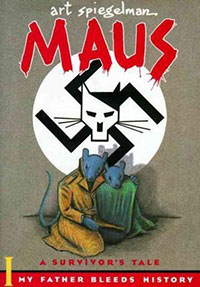 Art Spiegelman
Art Spiegelman
Maus: A Survivor’s Tale (1986–1991)
Nominated by Miriam Katin: “The stories of our survival during World War II, the fate of our family and the years after the war, were always a constant running narrative in my mind through the years. They were an unwanted, uninvited presence. They begged to be told. Spiegelman’s graphic novel Maus gave me the permission to draw my stories. You could call it inspiration as well, but it ran much deeper than just being inspired. It started my life in books.”
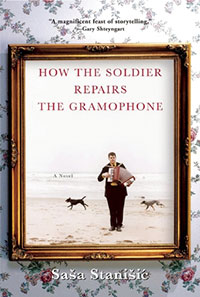 Sasa Stanisic
Sasa Stanisic
Wie der Soldat das Grammofon repariert (2006; Eng. How the Soldier Repairs the Gramophone, tr. Anthea Bell, 2008)
Nominated by Peter Sís: “Stanisic’s book takes place in Yugoslavia at the time of its breakup. It is about a war between neighbors—Bosnians, Serbs, Croats—frustrated by totalitarian coexistence that explodes with cruelty and savagery in incomprehensible ethnic cleansing. In this book, you see the corpses. Yet most of all, it is about a little boy who survives because of his language and imagination. It is about a hope for the future, at least a little bit.”
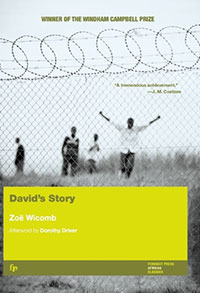 Zoë Wicomb
Zoë Wicomb
David’s Story (2000)
Nominated by Gabeba Baderoon: “This superbly written novel is a nonnationalist text written at the height of post-apartheid South African national political sentiment, observing no polite loyalties that erase awkward truths about the conduct of just struggles. Moreover, it is a feminist account of the anti-apartheid struggle, which means it can be searingly direct about the sexual violence that marked both sides of the fight for justice. It prefigured and modeled a necessary practice of freedom: how to ask difficult questions about those narratives that have a tight hold on our loyalties. David’s Story is a courageous and brilliant book that appeared at an angle to the political sentiment of its time, in other words, at exactly the right time.”
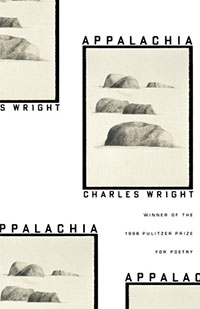 Charles Wright
Charles Wright
Appalachia (1998)
Nominated by Mark Tredinnick: “When I was feeling my way in the dark out of prose, along the rope bridge of lyric, Charles Wright’s poetry came to hand, and that migratory bird, my poetic voice, sensed in the habitat of Wright’s quintrains and sestets, in his elegant and astringent devotionals, the strains of a home I'd fledged and flown from once. His easygoing lyricism makes landscape and language holy again, and each moment of the trouble we all find ourselves in as beautiful as a horse at a creek at dusk. I found Appalachia in Oregon, as I was about to fly home to Australia, and what I read felt like the work of the master to whom my poetry ought to be apprenticed.”
